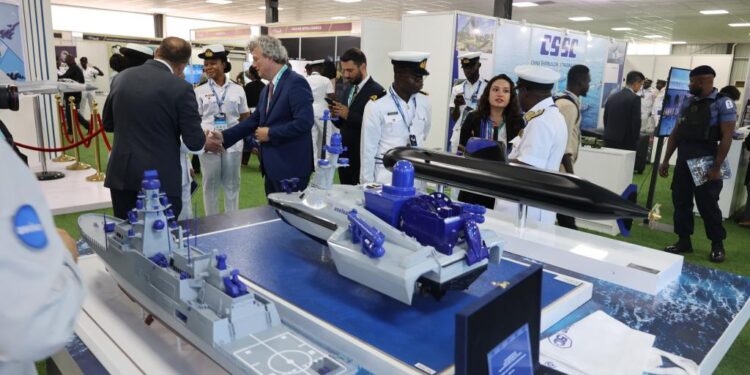Accra, Ghana — The 4th Annual International Maritime Defense Exhibition and Conference (IMDEC) convened this week in Accra, drawing defense industry leaders, government officials, and maritime security experts from across the globe. The event, highlighted by cutting-edge exhibits and high-level discussions, showcased the latest advancements in naval technology and strategic partnerships aimed at enhancing maritime security in the West African region. Organized to foster collaboration and address emerging threats, the conference positions Ghana as a pivotal hub for defense dialogue and innovation in maritime affairs.
International Collaboration and Technological Innovations at the Maritime Defense Exhibition
The 4th Annual International Maritime Defense Exhibition and Conference in Accra served as a critical platform for fostering multinational partnerships and unveiling cutting-edge technological advancements shaping the future of maritime security. Delegates from over 30 countries engaged in dynamic exchanges focused on enhancing cooperative strategies against emerging maritime threats, emphasizing the importance of shared intelligence and joint operational frameworks.
Showcasing a range of innovative solutions, industry leaders and defense experts introduced next-generation systems poised to revolutionize naval capabilities. Highlights included:
- Autonomous unmanned surface vessels equipped with advanced sensors for real-time surveillance.
- AI-driven maritime threat detection systems designed to provide predictive analytics for enhanced situational awareness.
- Next-level cyber defense platforms safeguarding critical naval infrastructure from complex cyber-attacks.
| Innovation | Purpose | Collaborating Nations |
|---|---|---|
| Smart Radar Integration | Enhanced target tracking | Ghana, Germany, Japan |
| Marine Drone Fleet | Coastal patrol & rescue | USA, UK, South Korea |
| Cybersecurity Mesh | Naval system defense | France, Israel, Nigeria |
Key Challenges Addressed in Maritime Security and Regional Defense Strategies
Maritime security in West Africa remains a critical concern amid rising threats such as piracy, illegal fishing, and smuggling across key coastal waters. Delegates at the conference emphasized the necessity of integrated surveillance systems and stronger naval cooperation among regional states to effectively counter these challenges. Special attention was given to enhancing real-time intelligence sharing and deploying advanced maritime patrol technologies to safeguard vital shipping lanes and offshore resources.
Key initiatives highlighted during discussions included:
- Joint maritime exercises to improve interoperability of regional forces
- Capacity building through training programs focused on cyber and physical maritime threats
- Development of legal frameworks to address cross-border maritime crimes more effectively
- Investment in coastal radar and satellite monitoring infrastructure
| Challenge | Proposed Strategy | Expected Outcome |
|---|---|---|
| Piracy | Regional naval patrol coordination | Reduced hijacking incidents |
| Illegal Fishing | Enhanced maritime law enforcement | Protection of marine biodiversity |
| Smuggling | Comprehensive border surveillance | Disruption of illicit trade routes |
Recommendations for Enhancing Maritime Safety and Strengthening West African Naval Partnerships
In addressing the complex challenges faced by maritime security in West Africa, experts at the conference emphasized the critical need for enhanced cooperation among regional naval forces. Key recommendations included the establishment of unified maritime surveillance systems, increased joint training exercises, and the adoption of interoperable communication technologies. These measures are designed to fortify the collective ability to combat piracy, illegal fishing, and trafficking activities that threaten the stability of the region’s maritime corridors. Enhanced information sharing protocols were also underlined as a vital step towards quicker response times and more effective deployment of naval assets.
Furthermore, fostering partnerships through regular multilateral forums and capacity-building initiatives was identified as essential for sustaining long-term security. Delegates called for investment in advanced navigation and reconnaissance tools while advocating for updated legal frameworks to streamline collaborative operations. The conference showcased a comparative overview of current naval capabilities and projected growth opportunities, as illustrated in the table below:
| Country | Current Naval Assets | Projected Enhancements |
|---|---|---|
| Ghana | 10 Patrol Vessels | +4 Offshore Patrol Craft |
| Nigeria | 15 Frigates & Patrol Boats | Advanced Maritime Surveillance Systems |
| Senegal | 8 Coastal Patrol Units | Joint Training Programs |
| Ivory Coast | 6 Interceptor Boats | Enhanced Communication Networks |
Final Thoughts
The 4th Annual International Maritime Defense Exhibition and Conference in Accra has once again solidified Ghana’s position as a strategic hub for maritime security in the West African region. Bringing together defense officials, industry leaders, and policymakers, the event showcased the latest advancements and fostered critical dialogue on enhancing maritime cooperation and security. As challenges on the continent’s waterways continue to evolve, the conference underscored the importance of collaborative efforts to safeguard Africa’s vital maritime interests. Organizers and participants alike expressed optimism that the insights and partnerships forged during the event will contribute to a more secure and resilient maritime future.













